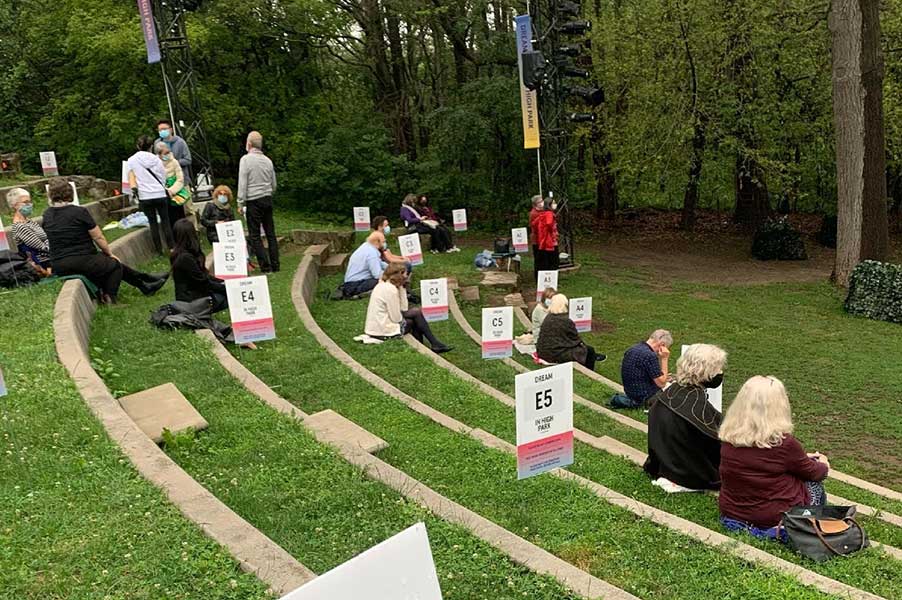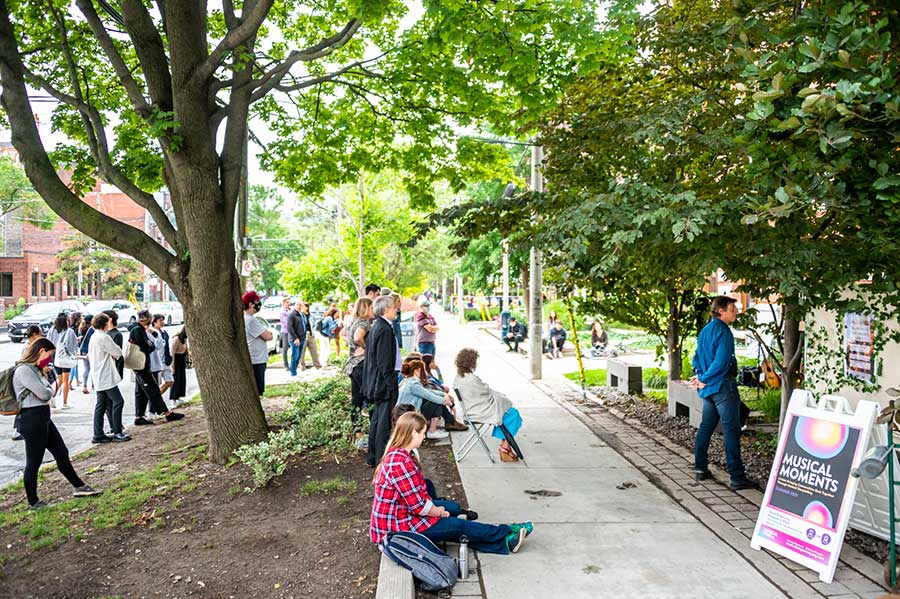
It was the applause that made me cry.
After 16 months of Zoom play readings, digital film-theatre hybrids and way too much streamed TV, I had forgotten what it felt like to clap along with a bunch of strangers to show appreciation for something we’d all experienced together.
So when the sound of 50 pairs of hands echoed around the High Park Amphitheatre after three musicians from Tafelmusik Orchestra played a modest little concert, I teared up.
My glasses got steamy, and not just because I was wearing a mask. Lockdown and isolation have made us all a little fragile. And here I was, witnessing the gradual return of live theatre. Live outdoor theatre, that is.
My assignment was simple: to see as many live outdoor shows as possible. In this uncertain period after the pandemic’s third wave and before theatres reopen, several brave companies made plans. Canadian Stage was the first local company out of the gate, announcing presentations with other companies in the High Park Amphitheatre, normally the venue for their annual Shakespeare productions.
Smaller companies scheduled porchside shows. Stratford and Shaw erected canopies to woo audiences to their outside offerings. Comedians performed on the Humber River, but you needed a canoe to see them.
And so, in the space of about two weeks, I took in one concert, one walk-about play and three cabarets. I was supposed to see a dance performance, but it got rained out – one of the hazards of outdoor theatre.
Midway through my series of shows, the province announced it was moving into step 3 of the reopening plan, allowing for larger outdoor gatherings and even some indoor performances. Much like my immune system after receiving my second vaccine, I’ve been building up my resistance so I can take in longer shows. Most of the things I’ve seen have clocked in at a very manageable one hour. I’m visiting the Stratford and Shaw Festivals shortly for a few two-act offerings. What will intermissions be like in the age of COVID? I can only imagine.
Here are some thoughts on what this once-in-a-lifetime experience has been like.

Making C-O-N-T-A-C-T
My first show back is a 50-minute outdoor piece performed at College Park called C-O-N-T-A-C-T. Two actors wearing face shields mime a psychological drama about secrets, loss and grief.
First we have to identify them from among the non-actors. And then we have to shadow them from place to place, all while ignoring the stares of passersby wondering what’s going on.
Through headphones, we can hear their dialogue and even some of their inner thoughts. But compared to the liveliness of the cityscape – people around us getting high or enjoying a coffee on a newly opened patio – it’s hard to connect to what’s going on.
The fact that the pre-recorded audio isn’t coming from the performers (it was taped separately by other actors) gives the work a strange, disembodied feel. Some technical glitches make matters worse.
But as the first live, in-person show I’ve seen in more than 10 months, C-O-N-T-A-C-T provides a safe, albeit tentative, first step out into the open.
The fact that the show is being performed among large crowds makes me think of all the drama going on in people’s daily lives. While we’ve been stuck at home, we’ve all been stuck in our own heads; it’s nice to think about other people for a while – which is one of the benefits of live theatre.
What the piece lacks, however, is any sense of ceremony and occasion; there are no introductory remarks or thank yous at the end. When it’s done, and a dozen of us applaud from where we’re sitting or standing, that’s it. Did I really just see a show?

If it ain’t baroque…
My next show – a chamber concert featuring three members of the Tafelmusik Baroque Orchestra – comes a week or so later. It’s one of the first returning concerts at the High Park Amphitheatre, a spacious (capacity: 1,000) venue of concrete and grass that has some history and gravitas.
This feels way more like a real theatre experience, with someone to scan the QR code on my phone and an usher to guide me to my pod. Sections are clearly marked with signs, and we’re all masked and appropriately distanced from each other.
What also makes this feel like an almost-normal theatre experience is that I’ve brought along a friend. Pre-pandemic, Rachel and I would go to lots of theatre together – at least a show a week. We haven’t seen each other in more than six months, and so spend most of the time before (and after) the concert catching up. Our conversation reminds me of another aspect of theatre-going I’d forgotten: that it’s a social experience.
There’s more ceremony to this show. Viola player Patrick G. Jordan introduces each piece, telling us what to listen for. And after the first number, a lively string trio movement by a lesser-known composer named Joseph Leopold Edler von Eybler, we applaud, and that’s when I begin to tear up.
It’s like I’m suddenly using muscles that have atrophied since March 2020. With each piece, I start to feel more like myself. There’s even a moment during one of the compositions – I think it’s a Schubert string trio – where time seems to stand still. I forget where we are. I forget I’m wearing a mask, and why.
Mind you, it’s going to take time to get used to public events like this. Between numbers, someone’s cellphone goes off. During one piece, the couple in the pod behind us starts talking loudly. The woman in the pod ahead of us keeps getting distracted by the sounds of birds chirping in the trees.
We’re all going to have to re-learn how to behave at the theatre.

New talents are sprouting up
My next show is part of Musical Stage Company’s Musical Moments series of pop-ups around the city featuring mostly emerging artists.
It’s a sultry Friday night, and a small patch of green outside a nondescript office building in the entertainment district has been transformed into an al fresco stage, where a group of young musicians puts an intriguing spin on songs from the musical The Secret Garden, interspersed with poetry by the show’s director, Katherine Cappellacci (pictured, above).
While the sound mix could use finessing – I later find out it’s the group’s first time performing in-person, since all their rehearsals have been via Zoom – and though some of the voices wander off pitch, there’s a warmth and sincerity to the show. And in the context of a pandemic, the theme of a garden coming back to life feels especially poignant.
A couple dozen people are standing, sitting or kneeling to watch. Pedestrians pass by, and some of them stay for a while then continue on their way.
I chat with a couple, Rob and Jenn, who know Cappellacci and the show’s producer, musician Sean Yauk. They’re both music fans and recently saw a drive-in concert featuring Jim Cuddy a couple of weeks earlier. Even though it was raining and the windshield fogged up, they loved it.
“Instead of clapping, we honked,” says Rob. “It reminded us how important this is in our lives. That connection.”
“It gave us a tiny taste of what we were used to,” says Jenn. “It was a little sad. It opened up a part of ourselves that had been closed for so long, but it wasn’t totally the thing, since we were all in cars. So it was bittersweet.”
It wasn’t totally the thing: that expresses exactly what I’ve been feeling for the past week. But even if it’s not the thing, it’s some thing. Which is more than we’ve had for a year and a half.

Fabulous Fam Jam
The following night, I attend a Porchside Songs cabaret in the front yard of a Forest Hill home. The host, Richard, has told me I’m welcome as long as I bring my own chair. In fact, he’s put up flyers on street poles inviting neighbours to come join him, his partner, relatives and friends.
Tonight’s performance is Fam Jam by the enormously talented siblings Gabi and Jake Epstein. It’s the most professional live show I’ve seen since the pandemic. The pair tell charming stories about growing up, their bickering family car trips to New York City and the shows they saw on Broadway that eventually inspired them to pursue showbiz. And their songs, a mix of pop tunes and Broadway hits, all tie in thematically with the material.
The revue is an ode to both family and musical theatre, and it goes over beautifully with the crowd, which has grown to dozens by the time the hour-long show is over. (Not many are masked, but the stage manager, Lucy, has said that if people want to talk to the performers they need to wear masks.)
“Some people came out of their houses when they heard the amplified music and came over,” said Richard, after the concert.
There’s a sense of community, of people coming together over art and being energized by it – something I haven’t witnessed in a long time. Would we all have had this moment without the pandemic? Probably not.

Thinking outside the Box
My final show is one of Tapestry Opera’s Box Concerts. The 30-minute show takes place on a travelling stage that goes to private homes, streets, neighbourhoods, care facilities and retirement homes.
About 100 concerts are planned for this summer. The one I attend is behind a downtown retirement home, with several residents and care providers watching. Eventually we’re joined by some passersby from an alley who have been drawn to the music.
Tenor Asitha Tennekoon, who was so excellent in Tapestry’s The Rocking Horse Winner, sings songs from both musical theatre and opera, with an original script (by Donna-Michelle St. Bernard) and music (by Benton Roark) providing an overarching story.
Before the concert begins, Tennekoon tells me doing the concerts has been inspiring.
“At some care homes, sometimes we’ll just do a set of songs, and a lot of them are older musical theatre pieces,” he says. “To watch the residents, even if they’re not looking at the stage, mouth some of the words, nod along and even conduct in the air is simply beautiful. What I’ve missed during the pandemic is the exchange of live energy, and knowing that what you’re doing affects someone.”
The sound of Tennekoon’s amplified voice in this concrete jungle often seems out of place. But he perseveres, determinedly staring down drivers making deliveries in the alley a few feet away. Near the end of the set, a stranger from the alley takes an empty seat, drinks from a mickey in his pocket and lights up a cigar. You won’t see this at a Mirvish show.

Tennekoon starts singing an encore, Younger Than Springtime, and the woman next to me – who’s remained pretty quiet all this time – says, “Oh, I know this song.”
I nod to her, my eyes suddenly welling up, and look behind us, up at the building. Some residents are pressed against the windows, enjoying the show.
Theatre may look different right now. But it’s coming back.
Glenn Sumi discusses the return of live theatre in the latest episode of the NOW What podcast, available on Apple Podcasts or Spotify or playable directly below:
NOW What is NOW Magazine’s twice-weekly podcast. New episodes are available Tuesdays and Fridays.












